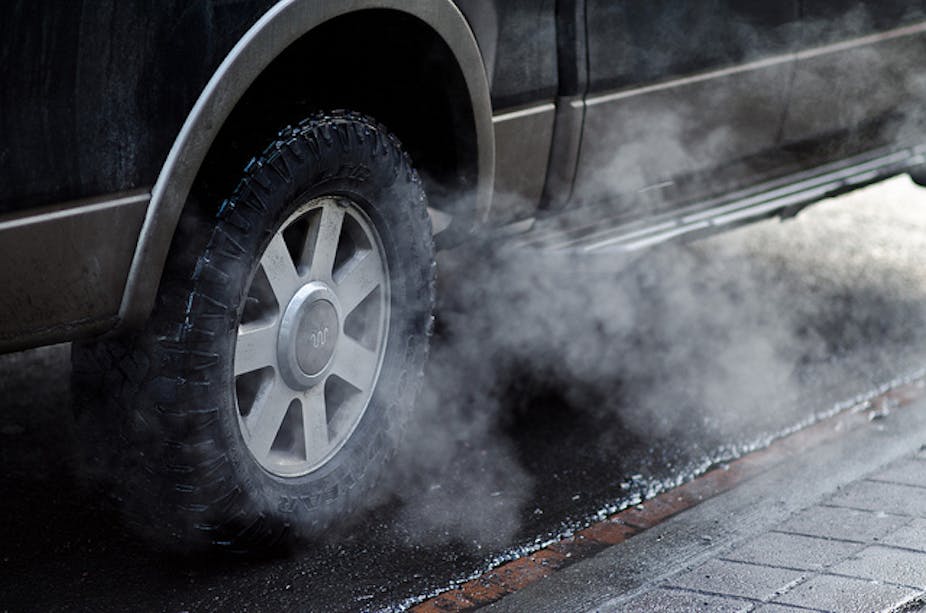The World Health Organization’s recent decision to categorise diesel fumes as carcinogenic is yet another reminder of the negative health effects of traffic pollution. Cancer can now be added to a list that includes asthma, reduced lung function, respiratory disease, cardiovascular disease, hospitalisation and death.
If traffic pollution had a distinctive smell, its levels could be judged by anyone at anytime. The smell would be strongest during the morning rush hour, and at busy junctions where the traffic builds up and engines idle.
Given the many negative health consequences of traffic pollution, people may want to limit their exposure. But this is difficult because most exhaust gases are odourless and invisible. There are slight smells from sulphur dioxide (rotten eggs) and nitrogen dioxide (acrid burning), but nothing from some of the most dangerous pollutants, such as carbon monoxide, particulate matter and ozone.
Knowing the dirtiest times and places would then enable people to avoid exposure, which is a key recommendation by the recent expert review on reducing the harms of traffic pollution. Exposure could be avoided by taking a different route to work, or jogging at a different time of the day.
The possibility of making traffic pollution smell is demonstrated by the already smelly exhausts of some alternative fuels, such as chip fat. A smell could be added to standard fuels by using an additive, such as methanol or butanol, that smells after combustion. It may also be possible to create a temporary smell-making device that fits to exhausts. These devices could be handed out on World Environment Day (June 5) to create the largest stink.
If traffic pollution smelled it might encourage policy changes to reduce exposure. One easily fixable example is drive-throughs, where staff spend long hours next to idling engines, and often in enclosed spaces. The staff and their employers are probably unaware of their high exposure to traffic pollution. Adding a smell would soon change that, and could then instigate a simple policy such as asking waiting drivers to turn off their idling engines.
Another example where turning off idling engines could realise massive health benefits are school pick-up zones, where lines of children (whose lungs are particularly vulnerable to traffic pollution) stand next to lines of idling engines. If children, parents and schools were made aware of the problem of traffic pollution via a smell, we’re sure many schools would encourage parents to turn off their idling engines.

A public that is more aware of the health effects of traffic pollution may also be more amenable to difficult policy changes such as pedestrianising city centres, which are often heavily polluted. It may also make the public more wary of the planned locations of new roads. Many of the recently added or expanded roads in Brisbane are right next to hospitals and schools, two places where increasing traffic pollution will have a strong negative impact on health.
We’ve become accustomed to warnings for most other dangers we encounter. In many countries, a warning agent is added to liquid gas to warn of leaks. Likewise, the dangers of vehicles reversing are flagged using loud noises. There’s little difference between adding a noise to vehicles and adding a smell, as both appeal to our senses in order to reduce morbidity and mortality.
There are some downsides to adding a smell to traffic pollution. A strong smell would penetrate into peoples’ homes, especially those who live near major junctions. This may cause a sense of helplessness and frustration, as well as a social stigma for those who live in the smelliest areas.
The petrol and automotive industries are unlikely to support this change. They will probably argue that time and money is best spent elsewhere, such as on developing improved fuel or vehicle technology to reduce traffic pollution. But a completely clean vehicle fleet is 20 to 40 years away, so interventions to reduce pollution exposure are needed now.
Governments may be reluctant to impose a measure that is unpopular with big business, who lobby and fund re-election campaigns. However, the arguments against doing nothing are strong, and the success of difficult policy changes such as the smoking ban in pubs shows that such bold policy changes are possible.

